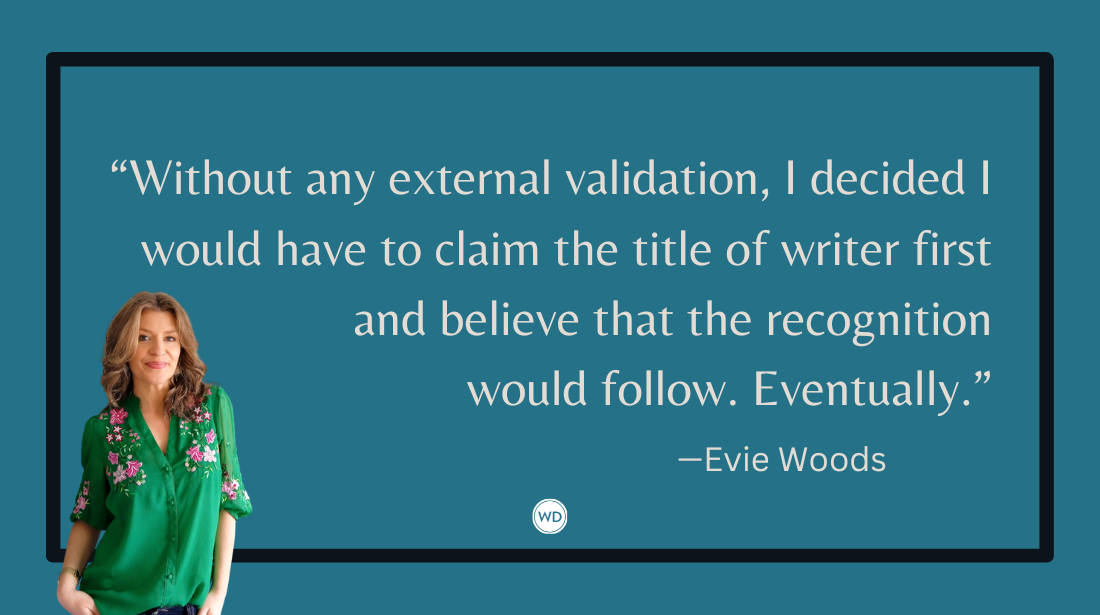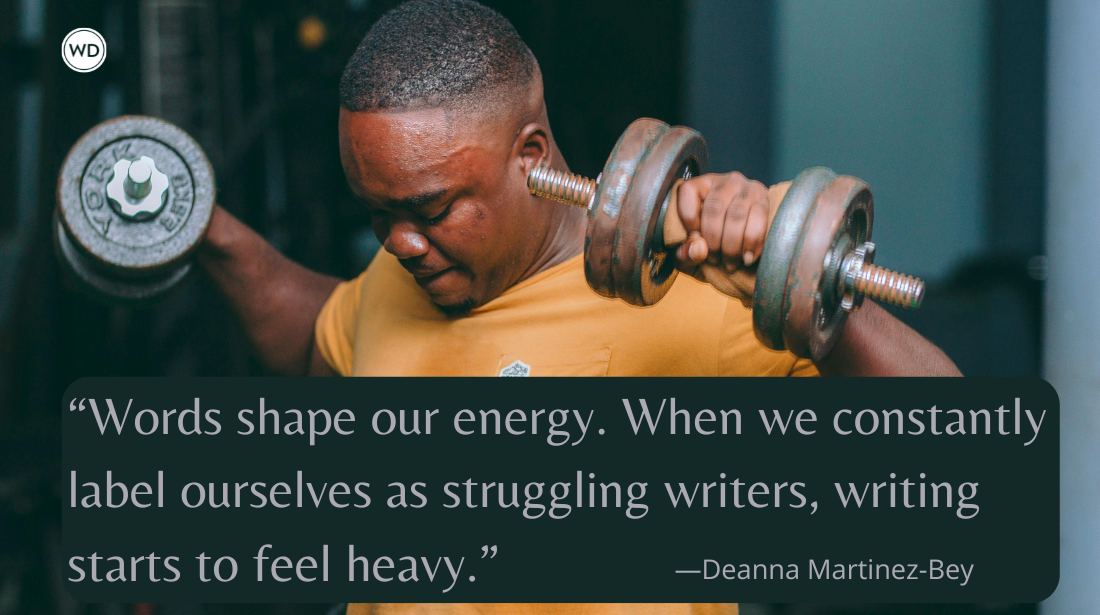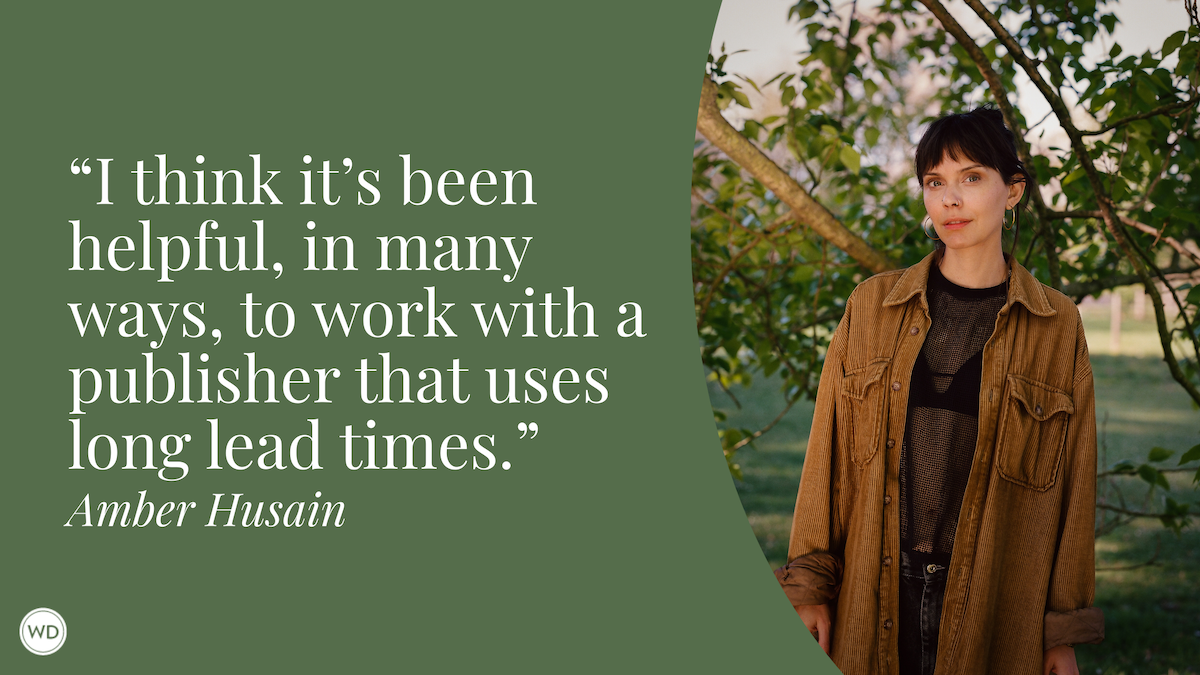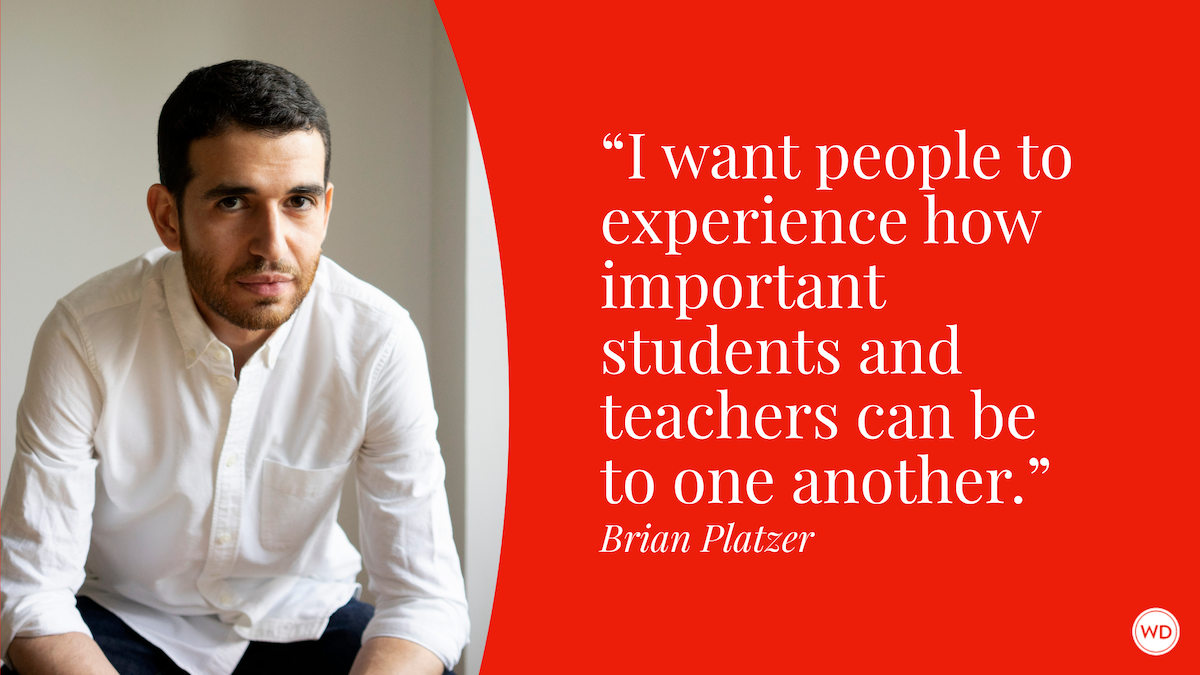Breaking In: July/August 2025
Debut authors: How they did it, what they learned, and why you can do it, too.
WD uses affiliate links.
Rhonda Dechambeau
Top Heavy
(YA verse novel, June, Holiday House)
"After landing a spot on a competitive dance team, a top-heavy dancer dreams of breast reduction surgery amidst her family’s growing financial problems, a deteriorating friendship, and a first love romance."
Writes from: Southeastern Massachusetts.
Pre-Heavy: After many years of writing on my own and taking classes here and there, I earned my MFA from the Vermont College of Fine Arts in 2019. I applied and was selected as the 2022-2023 Associates of the Boston Public Library Writer-in-Residence with the first twenty pages of Top Heavy. This amazing program provides a generous stipend and an office at the Boston Public Library for an unpublished writer for children or young adults. This was actually my sixth time applying for this amazing opportunity. I’d been named a finalist twice before, and I really felt like I had something special with this story.
Time frame: When I was selected for the Writer-in-Residence program, I had about twenty-five pages of Top Heavy drafted. I also had a sense of where the story was headed. I threw myself into the writing, determined to make my year-long residency count. After about three months, I had a completed draft.
Enter the agent: My agent, Elizabeth Bennett from Transatlantic Literary Agency, reached out to me after I’d won the Writer-in-Residence fellowship. She’d read the description of Top Heavy and was interested from the start. I sent her my beginning pages, as well as some pages from other projects. Because she’s based in the Boston area, we met in the Boston Public Library over coffee. We seemed to be a good match, so I was thrilled when she offered to represent me! Having been in the querying trenches with other projects, I knew what a gift this was.
Biggest surprise: How long everything takes! From the submission process to the editorial process to the production and actual printing of the book! I’m still amazed at what a tremendous amount of work goes into the final product and how many people are involved in making it become a reality!
What I did right: I kept going! And I never stopped writing new things. Top Heavy is the fifth novel I’ve written, including some really early, really awful novels. Some of the more recent projects have potential, and there’s a chance I’ll go back to them. But I believe that you have to keep writing new projects, pursuing new ideas, and trying new things. Top Heavy was the first verse novel I’d written, and I’m so glad I tried my hand at that format.
What I would have done differently: There is no substitute for putting the time into your writing practice and for getting feedback on your writing. If I could do it over, I’d try to be more consistent in the time I put into my writing. (Although, between raising a family and working full-time, this didn’t always seem possible!) I’d also start getting feedback on my work (through classes, workshops, or critique groups) much earlier than I did.
Platform: I think being a good literary citizen and building community is key to gaining readership. I’ve offered free poetry workshops for teens at my local library and make a point to attend book festivals, conferences, and other writers’ book events. I recently launched a new website and offered a free newsletter for subscribers. It’s all about building meaningful connections with those who love to read and write!
Advice for writers: One of my favorite quotes comes, not from a writer, but from basketball legend Julius Erving: “Being a professional is doing the things you love to do, on the days you don’t feel like doing them.”
Next up: I signed a two-book deal with Holiday House. My second book, Stained, a middle-grade verse novel, will be released in Fall 2026! And of course, I’m on to the next new project, a YA novel with multiple points of view.
Website: RhondaDeChambeau.com
Hazell Ward
The Game Is Murder
(Crime fiction, July, Penguin Berkley)
"A whodunit based on an infamous unsolved case, where the reader gets to examine the evidence, interview the witnesses and solve the case."
Writes from: Wrexham, North Wales. Home to the third oldest (and best) football club in the world.
Pre-Murder: I wrote this novel as part of a PhD in Creative Writing, which meant that, rather than starting with a plot idea,
a character, or even a snatch of dialogue, I began with a research question about the contract between a writer and their reader. Which, admittedly, doesn’t make for a great elevator pitch.
Because I have always loved crime fiction, particularly whodunits, I thought it would be fun to use the game element of the whodunit to explore my research question and write a novel that involved the reader in that game at the same time.
It also meant I could read a lot of crime novels and call it work!
Time frame: I have a very inefficient way of working. I start writing at page one, I keep on writing linearly until I reach the last page, and I constantly rewrite as I go. I have read dozens of How to Write books over the years, and nearly all of them tell you not to do this, because when the novel takes an unexpected turn, you have go back to page one and start again. Which can be very frustrating. On the upside, however, when I get to the last page, the novel really is finished.
It took three years, and dozens of restarts, for me to write the novel, and what I ended up with is very different to the book I planned to write when I began. But it is a better book because I allowed myself time to figure it out as I went, I think.
I am hoping that the next novel won’t take quite so long to write!
Enter the agent: While I was writing The Game is Murder, I decided I needed to have a strategy to attract an agent. My writing CV up to that point consisted mainly of non-fiction magazine articles and a couple of minor fiction pieces in small circulation magazines. I decided to write some short crime fiction and submit to competitions. One of those short pieces was shortlisted for a Crime Writer’s Association dagger, which is a prestigious UK crime writing award. I went to the awards ceremony knowing I wouldn’t win, because all the shortlist-ees, except me, were published, even award-winning, crime writers, but I was determined to network with agents and editors if I got the chance and try to interest them in my novel. In the end, I didn’t need to, because Sarah Such, of the Sarah Such Literary Agency, was seated at my table.
Much to my surprise, I won the dagger, and Sarah bought me champagne to celebrate. We drank the champagne. We chatted about my novel, and she asked me to send it to her. Sarah has been my brilliant agent ever since.
Biggest surprise: I was surprised at just how long everything takes, and how very complicated publishing contracts can be. I thought I had a fair idea of how it all worked, but I really underestimated what a huge operation it is, and how many people are involved in publishing a single book. I have been very lucky in having great editors who not only loved the book but also wanted to make the process easy, or as easy as such a complex process can be, for new writers like me.
What I did right: I just kept trying to improve. The Game is Murder is not the first book I wrote. It isn’t even the second or the third. And some of those early novels were truly awful. You have to be able to look honestly at what you have written and admit it (to yourself) when you haven’t pulled it off. I never sent those early novels to anyone, because I knew in my heart that, although they were the best I could make them, they weren’t good enough.
But I got better with each failure. I took courses. I joined writing groups. And, of course, I read a lot. The thing that really helped, though, was entering competitions. Being listed in a writing competition, even if you don’t win, is great for your writing CV. It can help to bring you to the notice of agents and publishers. Most importantly, it demonstrates to you, as a writer, that your writing is good enough and that the effort is worth it. Writing is so hard. You can spend years writing a novel that no one wants to read, and you need enormous self-belief to keep going in the face of rejection. So every win, no matter how small, should be celebrated. Preferably with champagne.
What I would have done differently: I would have kept better track of my sources! Because my novel was based on a real case, I needed to do a lot of research. And my referencing systems just weren’t good enough, which meant I spent far too much time rifling through books and articles to double-check the distance between the crime scene and the front door, or what the blood group of that stain next to sink was.
If you record it properly the first time, it saves you so much trouble!
Platform: The subject of platforms did not come up during our initial negotiations. As we made a deal very quickly, as a result of a pre-emptive bid, there was no time for them to check on this. Which was lucky for me, because, until recently, I had virtually no social media presence at all. I am still very much a novice when it comes to socials, but I do know that, increasingly, publicity departments expect authors to have some kind of presence. And, though there are always some downsides to being online, it’s been nice to see such a flourishing book community on these platforms, so I am converted. I don’t think that a small platform would necessarily prevent a publisher from making an offer if they liked the book (unless the premise of the book expected it). In any case, the period between agreeing an offer and publication date can be anything from twelve to twenty-four months, plenty of time to build up a following if you need to.
Advice for writers:
Next up: I am hard at work on the second book, though it is not a sequel to this novel. While it might be tempting to write a series of novels in the same way, or with the same detective, I’m glad that I have left myself room to experiment. Second novels come with their own problems, I’m discovering, so I am just trying to keep on learning, and write the best book I can.
Website: HazellWard.com
Tre Johnson
Black Genius: Essays on an American Legacy
(Nonfiction, July, Dutton Books)
"Black Genius is a cultural exploration of the ingenious ways that Black Americans use our collective wit, relationships, art, and sense of community to navigate the sometimes unforgiving terrain of American society."
Writes from: I’ve written and write all over—Montreal, New Orleans, NYC, LA, DC, Martha’s Vineyard, and the Bay—and whenever it’s been possible and necessary, my home of Philadelphia.
Pre-Genius: Around 2017, I started getting my writing published in Philly Mag, Rolling Stone, The Grio, and other outlets. In the beginning, I spent a lot of time covering everything from tribute performances to Prince, how we were all trying to unpack the spate of Black American deaths that spurred so much of the BLM movement. Eventually, though, I also started segueing into more cultural analyses—examining thematic trends in Black films, asserting the cultural importance of Black Panther, and just developing a deeper critical eye about everything ranging from social topics in graphic novels to bringing a sense of contextualization to understanding artifacts and moments like This is America.
But on top of that, I was still often struggling to find spaces to write about so much of the everyday culture that I was experiencing, seeing, and grappling with—especially within and how it pertains to Black life in the country. As a longtime educator who most often worked in urban communities across DC, Philadelphia, and Camden, that work brought me into people’s most precious spaces—their homes, schools, churches, community centers and neighborhoods—and there were so many things about just spending time with everyday people, Black people in particular, talking and figuring out everyday things that I wanted to talk about too. I didn’t find a lot of places that wanted stories and experiences around Black jobs, ingenuity, and nimbleness, and more and more I found that those stories and perspectives could be joined with my published writing in Big Media, which could all together make a book of reflections.
Time frame: Lord, what a journey. I started Black Genius back in Spring 2021, and after about three significant rounds of editing with the amazing Lashanda Anakwah, I submitted the final, pre-copy-edited version of the book in August 2024. It’s hard to know if that pace is fast, slow, typical, or atypical, but it was, at the end of the day, my pace, especially against the backdrop of life in general. One of the things that I think really helped me finish the book was just owning my desire for movement and following the muse of place and space—some of my biggest book epiphanies tended to come walking at night, sometimes related to the book, sometimes not.
Two moments come to mind as a result:
–One summer night, I was horrendously stuck trying to figure out how to address some edits, so I walked over to the Philadelphia Art Museum steps (most non-Philly people know them as the ‘Rocky Steps’) and came across a group of amateur motorcycle and motorbike enthusiasts that had gathered there in front of the steps. There’s a traffic circle in front of there—the Oval—and I sat on the museum steps for like 30 minutes watching bikers take off and weave themselves in and out of traffic, yanking their bikes up and doing wheelies, sometimes standing up and doing small tricks. There was an ice cream truck, and families, couples, and solo watchers like me were milling about the truck, getting a cold treat and watching the racers. Now, of course, something like this is considered illegal and dangerous, but it was amazing how much the scene felt like this night show, night festival, of sorts. I sat there feeling really in awe and inspired by a combination of community, daring, spectacle, and just enjoyment.
-In Montreal, 2023, I was staying in a friend of a friend’s apartment that I’d rented for the month. One night, there was a massive blackout in the Plateau Mont Royal area. The blackout took up several blocks—just entire grids of the area wiped out and blanketed in darkness—so I had to stop writing and just took a series of circular walks all through there and nearby Mile Ex. It was still dinner and drinks time for a lot of people, so I walked by a lot of bars and restaurants where people refused to leave, sitting at their tables lit with their cellphone lights, or waitstaff had trotted out candles and flashlights. Everywhere had this dreamy, intimate, tender feel to it—every window stop looked like peering into a silent film—and ultimately, seeing people continue on with the time with each other, still eating, not letting this bigger inconvenience disrupt the small things—got me to head back to the apartment and get back to writing in the dark.
Enter the agent: Sabrina Taitz, aka AgentBae, and I met through Suzanne Gluck, who plucked me out of a freelance writers’ webinar I was attending where she was the main speaker that session. That space was curated by the amazing David Hochman, who reached out to me after that seminar and said, “Suzanne Gluck wants to talk with you. Can I share your contact information with her? By the way, the answer is ‘yes.’” Ha! And so, after chatting with Suzanne, she introduced me to Sabrina—a junior agent at the time—and we joined forces to start the book journey of Black Genius. That all happened in late Summer 2020.
Biggest surprise: How much a book can and will truly change over the course of writing it. What I set out to write through my book proposal process way back in November 2020, when we took it out for consideration, is significantly different than what the end result ultimately was. It changed, I changed, we changed together.
I think another learning experience or surprise is how much tension there is at times with the fact that what you write is a distillation of what you think or thought about a given topic when you were engaging with it. There’s some nuanced thinking and feelings that I have about aspects of things that I bring up in Black Genius, and those nuances and changes make you wish that books could be living, iterative things. Instead, I thought that there was also a journey of accepting the idea that you will continue to live and evolve while your book or aspects of your book, will remain in a certain time and place of who you were at various moments.
What I did right: I always think that writers write. And because of that, one of the biggest things that has always helped me was the willingness to focus on writing for and in the places that allowed me to write what I wanted to write about. I mean, I’ve written for obscure blogs, started and ended my own obscure blogs, and written for ‘big’ outlets and ‘small’ outlets. I’ve never really cared about the ‘prestige’ of my placements, and if you look at the body of my work, you’ll see that. I think that’s helped because there are amazing editors, conversations, and opportunities in all sorts of places.
The other thing I think that helped is just plain developing real relationships with the people who are your peers and your editors. And I mean real in the sense of checking in with people, paying attention to people’s lives during big, small, happy, and sad moments. I think you can figure out how to work on things with people by understanding each other and nurturing connections instead of being transactional with people. Writing in places, writing in writing groups, writing every day—and reading, loads and loads of reading across all topics and people—are big helps for me.
What I would have done differently: God, sometimes I really flagellate myself for not having pursued writing in a public, published way sooner. I love writing so much; it’s the most enriching, liberating, intimate, cerebral, and honest thing I get to do. It’s a balance at the same time; the (discouraging) professional experiences in particular that I’ve had before really investing myself in writing and being a writer have still ultimately informed things like my maturity, temperament, patience, and work ethic as a writer. But especially gratitude; there are a great many experiences and situations that I’d never want to go back to ever again.
So, knowing what I know now, I might’ve tried being less scared and bolder. An editor, Myles Johnson, spent a good year egging me on to leave what he called my ‘corporate life’ and embrace being a writer. I was too scared and insecure to believe it or listen until lots in life made me realize that I not only needed to, I wanted to step away from it all and into myself more.
Platform: I’m a longtime Instagram person, though lots about social media and their owners are making me reconsider my engagement and presence. So in that sense, yes, a platform (IG: @tre_john_son), but I’ve also started a Substack (TreJohnson.substack.com) now and have a website (TreJohnsonWriter.com) that captures a lot of my work and another way to reach out to me.
I really don’t focus much on building a platform and gaining a readership via social media—it always feels like a fool’s errand to me to overly produce original writing in those places, not only for free but also as it is susceptible to algorithm suppression. I think you build readership by continuing to write and share your writing—through published pieces, through relationship building with peers, through email essays and blogs—my IG has the occasional essay in a post, but I’ve really stopped indulging that space that way so much.
Advice for writers: Write every day. Read every
day. Read inside and outside of your comfort zone. Share your writing, especially when you’re worried it
’s shitty. You can’t be your own writer, critic, editor, and promoter—let others engage with any or even all parts of that process whenever possible.
Next up: Like a lot of writers, I’m ready to explore other genres too and just continue to challenge myself and readers on engaging with cultural stories, but also the types of conversations and dynamics that we need to spend more time on. So, to that end, I’m hoping to segue into more creative writing— screenplays, graphic novels, and the like—but I’m also becoming more and more curious about collaborative writing with others.
Website: TreJohnsonWriter.com
To see more from this issue, visit the Writer's Digest Shop to get your digital copy today!









